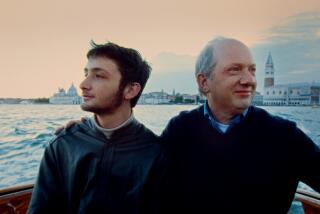FAMILIES : Genealogy : Many Searching Roots of Their Family Trees for Life’s Meaning, Security : Curiosity often replaces snobbery as the driving force for those who trace ancestry to paupers or kings.
- Share via
LONDON — “More and more people want to know who their ancestors were, what they did, where they lived and whom they married,” says Harold Brooks-Baker, publishing director of Britain’s Burke’s Peerage, a red-hot guide to bluebloods.
“Strange,” he adds, “but many Americans don’t know who their great-grandparents were.”
Most Americans may be late to the obsession, but ancestry has become more important in a complicated world, even in the melting pot. The reasons are as numerous as twigs on a family tree.
Noel Currer-Briggs, a fellow of the Society of Genealogists and author of Debrett’s Guide to Tracing Your Ancestry, explains, “We all have the most astonishing diversity in our family histories and a natural curiosity about it. . . .
“For a long time, legends were enough, but genealogy is the purest form of history as it concerns individuals, and eventually, the desire to find the objective truth concerning the actual ancestors was to exert itself.”
Why now?
“I think that, with the breakdown of the traditional clan and family, many people in modern society feel like ciphers,” Brooks-Baker says.
Adds Iain Swinnerton, president of the Federation of the Family History Society: “Wherever I go, I am asked this same question--why have so many people suddenly taken up this pastime of tracing their ancestors? . . . There are several answers.
“A few still do it for snobbish reasons--in the hope they will trace a descent from a royal or titled family or simply to boast how far back they can go.”
But in recent years, he says, the tracing of pedigrees has been largely replaced by the study of family history.
“Most people now realize that researching their ancestors’ occupations, hobbies and politics, as well as their virtues and vices, is so much more interesting and satisfying than merely seeing how far they can trace them back,” Swinnerton says.
“I also believe that there are a large number who have taken up tracing their ancestors in a subconscious search for security,” he says.
In genealogy research, the Burke’s and Debrett’s guides have become leading specialists on tracing family histories, modest or grand. And for many Americans, the search often leads back to historical sources in the British Isles, from which the English, Scots, Welsh and Irish set off for the land of America, followed later by people from every continent.
Historically, Currer-Briggs says, “The first records in Greece were genealogical by nature, but open to abuse and of little historical value.”
Even in the Roman Empire, he says, “The falsifying of patrician pedigrees back to Aeneas was a noted feature of that civilization. . . . Busts of bogus ancestors would be placed in the shrines rather in the way that latter-day parvenus purchase their family portraits in antique shops.”
Swinnerton says that “ ‘total ancestry,’ the study of all one’s ancestors, is a positive development of the new wave of interest. Most people now appreciate that we inherit our physical and mental characteristics from both our paternal and maternal progenitors and only our surname from our father’s line.”
But as Swinnerton slyly notes, a father’s surname is not always the true indicator of one’s heritage, since, in the old French adage, “only the mother knows the name of the father.”
The earliest genealogies are royal ones, since kings tended to marry princesses, and the earliest records, oral or written, were kept by royals. “Most people have royal blood,” said the late genealogist Iain Moncreiffe. “The difficulty is to trace it.”
And even the greatest of families have their ups and downs.
“No one knows when we’re going to come up with another genius, or just the opposite,” says Celia Sandys Perkins, the red-haired granddaughter of Winston Churchill, the famed British prime minister.
The Churchill family is one of Britain’s most distinguished, boasting a family knight, Sir Winston Churchill, as far back as the early 17th Century. His son John Churchill was a great general, who, for his battlefield exploits against the French, was named the 1st Duke of Marlborough, a line that continues to the present 11th Duke.
At one point, a Churchill family daughter married Earl Spencer, and the family name became Spencer-Churchill. Diana, the Princess of Wales, is a member of the Spencer branch of the family.
The Churchill family had its fallow period in the 19th Century, but it was restored to glory by Lord Randolph Churchill, who married an American, Jennie Jerome, whose family tree included an Iroquois Indian and George Washington. Their son was Winston: soldier, politician, historian and Britain’s World War II leader.
The search for ancestry is studded with pitfalls. Celtic genealogy, for instance, can get mired in the confusion of too many people with the same surname--thousands of families named Williams, Richards and Jones in Wales, Scottish glens where everyone is named Ross, and more than 100 families named Ryan in a single Tipperary village.
Genealogist Moncreiffe saw his specialty as a kind of jigsaw puzzle, since “true family history in depth is a tapestry of all those who ever lived and to whom we owe our existence, and the threads woven across it are the connected lives of their interwoven generations.”
“Families are seldom static. The rich are not always rich, nor the poor nothing but the offspring of untold centuries of poverty.”
More to Read
Sign up for Essential California
The most important California stories and recommendations in your inbox every morning.
You may occasionally receive promotional content from the Los Angeles Times.













